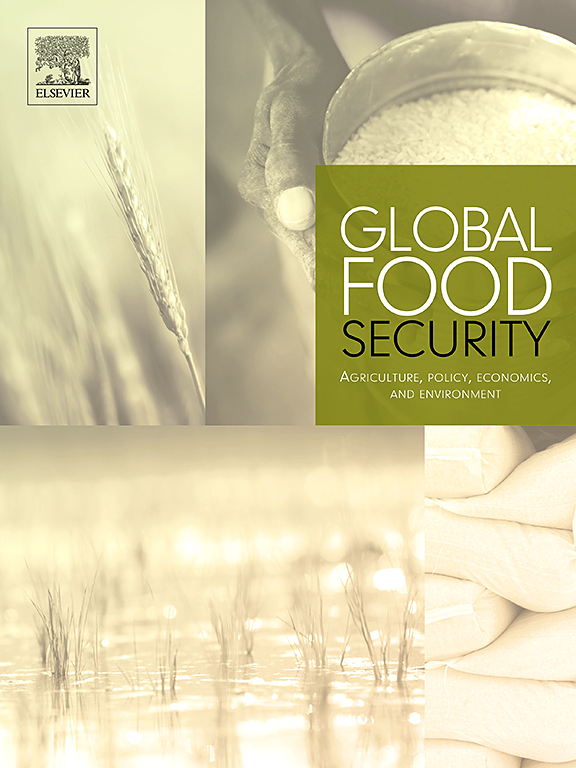Institutional food waste and the circular economy: Is it time to revisit produce waste in global food supply chains?
IF 9.6
1区 经济学
Q1 FOOD SCIENCE & TECHNOLOGY
Global Food Security-Agriculture Policy Economics and Environment
Pub Date : 2024-12-01
DOI:10.1016/j.gfs.2024.100819
引用次数: 0
Abstract
Food waste generated by large systems including hospitals and postsecondary institutions can greatly influence the reduction, reuse, recycling, and recovery of produce and other perishable waste items that are essential to human health and nutrition. We position the issue of food waste as it pertains to the circular economy to support the provision of fruits and vegetables through networks of food donating charitable organizations such as food banks in Canada. Similar models can be replicated in other settings where either government or private citizens can work with institutional partners to divert food susceptible to loss or waste to promote rescue. Added benefits include climate change reduction and support for improved planetary health. Wide-scale thinking is needed about these issues given the pertinence of global warming and climate change, and the need to sustain improved nutrition for our growing populations impacted by chronic diseases across the lifespan. Further study is needed to estimate the true quality and quantity (volume) of waste and benefits associated with diversion to human consumption related purposes.
制度性食物浪费与循环经济:是时候重新审视全球食品供应链中的生产浪费了吗?
包括医院和高等教育机构在内的大型系统产生的食物垃圾会极大地影响对人类健康和营养至关重要的农产品和其他易腐废物的减少、再利用、再循环和回收。我们将食物浪费问题定位为与循环经济相关的问题,通过加拿大食品银行等食品捐赠慈善组织网络支持水果和蔬菜的供应。类似的模式可以在其他环境中复制,在这些环境中,政府或私人公民可以与机构伙伴合作,将容易损失或浪费的粮食转移到促进救援的地方。其他好处包括减少气候变化和支持改善地球健康。考虑到全球变暖和气候变化的相关性,以及为受慢性疾病影响的不断增长的人口提供持续改善的营养的必要性,我们需要对这些问题进行广泛的思考。需要进一步研究,以估计废物的真正质量和数量(体积),以及将废物转用于与人类消费有关的目的所带来的利益。
本文章由计算机程序翻译,如有差异,请以英文原文为准。
求助全文
约1分钟内获得全文
求助全文
来源期刊

Global Food Security-Agriculture Policy Economics and Environment
FOOD SCIENCE & TECHNOLOGY-
CiteScore
20.90
自引率
3.40%
发文量
69
期刊介绍:
Global Food Security plays a vital role in addressing food security challenges from local to global levels. To secure food systems, it emphasizes multifaceted actions considering technological, biophysical, institutional, economic, social, and political factors. The goal is to foster food systems that meet nutritional needs, preserve the environment, support livelihoods, tackle climate change, and diminish inequalities. This journal serves as a platform for researchers, policymakers, and practitioners to access and engage with recent, diverse research and perspectives on achieving sustainable food security globally. It aspires to be an internationally recognized resource presenting cutting-edge insights in an accessible manner to a broad audience.
 求助内容:
求助内容: 应助结果提醒方式:
应助结果提醒方式:


